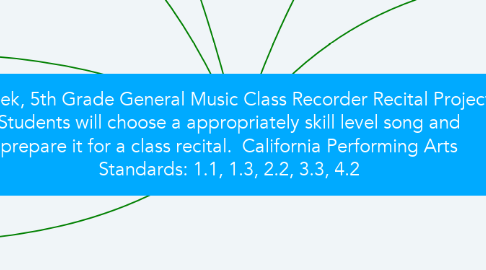6 week, 5th Grade General Music Class Recorder Recital Project Students will choose a appropriately skill level song and prepare it for a class recital. California Performing Arts Standards: 1.1, 1.3, 2.2, 3.3, 4.2
by Amy Odenwalder

1. Compacting
1.1. For this recorder project, I will have to assess what the students know about the recorder and what their level of mastery is. This will be done by using their final completed level of recorder karate from the prior year. Each level in recorder karate built important skills in a progressive order. Students will then choose from multiple songs that are appropriate to their level of mastery that will help build missing or improve/ challenge skills. This allows for students to focus their attention to working on skills that makes better use of their time and improves motivation.
2. Differentiated Homework with Homework Checkers
2.1. Students will be able to take their recorders home to practice their appropriately chosen song for homework. Students will have access to Smart Music that will help them practice efficiently at home and give the teacher and student feedback. This program allows students to see which notes and rhythms they played correctly/incorrectly, receive a performance score, and hear their recording. This program engages all students of all levels giving the support to stronger and weaker players using features such as a metronome, automatic tracker and play-back features.
3. Flexible Grouping
3.1. In the classroom there will be several people working/practicing the same song. At different points during the preparation for the recital, students that are performing the same piece of music can work and help each other in a group setting. Another week students from different levels can collaborate and take turns hearing and giving feedback to help each other out. Before all group work is started a conversation on how to give feedback and work collaboratively will be discussed with clear guidelines that are written on the board and on a checklist worksheet.
4. Interest Centers or Interest Groups
4.1. Students will choose from multiple songs from many different genres of music to practice and perform that are at their their appropriate skill level and they are interested in learning. Students that are very interested or motivated to get additional help playing the recorder can come to practice in the music room during lunch to gain extra support from the teacher outside of class time. Students will also have available to them additional resources on playing the recorder, listening examples, fingering charts, different recorders to play (alto, tenor, bass recorders) and how-to videos.
5. Learning Centers/Learning Station
5.1. During the project we will use learning stations to deepen their knowledge of the original song. At each learning station there will be materials for them to learn about their song: Who the composer or performer is, What is the era and history of when the song was written or composed, Practicing station and a Listening station where they can listen to the songs. Students will have to use a learning center worksheet to record their progress and findings in a note-taking style. These learning centers will provide a deeper understanding and appreciation of their chosen songs in a independent nature.
6. Tiering
6.1. To tier the project, students will be given and be displayed practice parameters or tasks to accomplish before they can add the next task. Correct notes/ fingerings, rhythms with proper articulation, dynamics, tempo, musicality and playing with an accompaniment. Each one of these skills/tasks build upon the one below it giving students a priority list of things to accomplish before the recital. During classes we will discuss these tiered skills in-depth and allow students to share thoughts and examples.
7. Varying Questions
7.1. Students will individually work with the teacher multiple times during the 6 week project and get specific discussion based on their particular needs. During this one-on-one time, the teacher will ask open-ended questions to provoke deeper thinking about what they need to do to improve their recorder skills. Teacher will use this time to give helpful feedback and allow the student to discuss their area of problems. This will be time to allow a discussion of how to improve and model proper recorder skills individually.
8. “Differentiated instruction” gives different students different ways to learn the same material. It’s an effective strategy for an obvious reason: kids don’t all learn the same way. Adjusting your teaching to better serve students with different learning styles sounds like an imposition — you have to offer more content, more material, spend more time working with students individually. In reality, it’s an opportunity. Differentiated instruction provides a way to meet the needs of every student.
9. Conclusion: I feel that all these strategies will work very well for this 5th grade recorder recital project. These strategies allow for success and motivation in a diverse skill-set classroom. It makes better use of student and teacher time by giving independence and ownership of their project. The one strategy that I want to use more of is tiering. I want to include more classroom discussion on that tiered list of mastery skills and how they can decipher their attainment. This will help show students how to practice efficiently and not get frustrated and quit. I feel this will really help those weaker recorder skilled players and those that need a checklist to benefit on how to master playing the recorder. I predict using these strategies the students will have prepared a very well practiced and impressive recorder recital.


